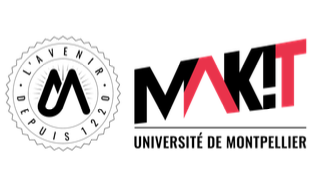MAK’IT Montpellier
Institut de Botanique
163 Rue Auguste Broussonnet
34090 Montpellier
contact:
Brenda Galvan
Project Manager
makit@umontpellier.fr

The Montpellier Advanced Knowledge Institute on Transitions (MAK’IT) was launched in March 2019 as one of the flagship projects of the Montpellier I-SITE (Initiative Science, Innovation, Territories, Economy) Excellence Program, an initiative coordinated by University of Montpellier on behalf of its consortium of 16 academic and scientific partners with funding from the French Government.
MAK’IT aims to enhance the contribution of scientific communities to the acceleration of transitions needed to achieve the Sustainable Development Goals (SDGs) in interconnected fields such as agriculture, food, environment, and health. The Institute uses innovative inter- and transdisciplinary approaches to address complex global challenges, creating a unique space for collaborative research and knowledge exchange.
Premises and facilities
MAK'IT fellows are hosted within the premises of a research structure of their choice within the I-SITE consortium, benefiting from work space with equipped desk and full access to research facilities. They also have access to MAK'IT's dedicated spaces at the historic Institut de Botanique, which includes direct access to the city's botanical garden, founded in 1593. This open, modern workspace provides a quiet and stimulating environment tailored to the needs of visiting researchers.
Additionally, MAK'IT fellows are hosted at the Villa Leenhardt, a 1900’s mansion located in a park on the Triolet Campus, close to public transportation and the city center of Montpellier. The Villa comprises 8 renovated, fully equipped one- and two-room apartments, as well as shared common areas such as a living area, a meeting room, coffee and tea space and a music room/library. For fellows who wish to visit with their family, MAK'IT collaborates with a seasonal apartment rental agency in Montpellier to offer alternative housing options.
Cultural outings and informal gatherings are also planned to foster interdisciplinary collaboration, encourage informal interactions, and support professional networking among fellows.
Scientific priorities in FIAS
The scientific policy of MAK'IT is aligned with the priorities of the Montpellier I-SITE community, a leading academic and research ecosystem dedicated to sustainable development, structured around three main pillars: Feed, Protect, Care seeking to promote innovative agriculture to contribute to food security and environmental quality; foster a transition towards an environmentally-friendly society; and improve human health in changing environments.